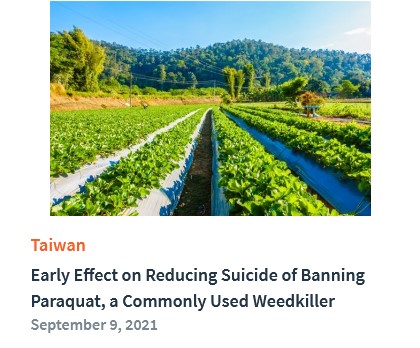
臺大公衛學院為加強宣導本院教師之學術成果,進而提升本院國際能見度,由張書森老師撰寫以下列文章投稿至ASPPH Friday Letter.
The early impact of paraquat ban on suicide in Taiwan.
該文目前已刊登於ASPPH Friday Letter, September 10, 2021
篇名:
Early effect on reducing suicide of banning paraquat, a commonly used weedkiller

【The early impact of paraquat ban on suicide in Taiwan.】
Author: Shu-Sen Chang
Associate Professor/Director, Institute of Health Behaviors and Community Sciences, College of Public Health, NTU
Introduction
Pesticide ingestion is a leading method for suicide worldwide. Paraquat is a highly lethal herbicide when ingested. We assessed the impact of the first-stage ban on the import and production of paraquat (from February 2018) on suicides by pesticide poisoning in Taiwan.
Methods
Suicide data by method (pesticide vs. non-pesticide), pesticide (paraquat vs. non-paraquat), and area/sex/age were extracted from the national cause-of-death data files (2011–2019). Negative binomial regression was used to estimate changes in suicide rates in 2019, compared to the expected rates based on pre-ban linear trends (2011–2017).
Results
The paraquat ban was followed by an estimated 37% (rate ratio [RR] = 0.63, 95% confidence interval [CI] 0.54–0.74) reduction in pesticide suicide rate (190 [95% CI 116–277] fewer suicides) in 2019, mainly due to a 58% (RR = 0.42, 95% CI 0.33–0.54) reduction in paraquat suicides (145 [95% CI 92–213] fewer suicides). Larger absolute reductions in pesticide suicides were found in rural areas, males, and the elderly (aged 65+ years) than their counterparts. Except for a 10% (95% CI 3–18%) reduction in overall suicide rates in the elderly, there was no statistical evidence for a change in non-pesticide and overall (all-method) suicides.
Conclusion
The ban on the import and production of paraquat was followed by a fall in whole-population pesticide and paraquat suicides and elderly suicides in Taiwan.
